- Home
- Naguib Mahfouz
Morning and Evening Talk Page 2
Morning and Evening Talk Read online
Page 2
Amr had more than one reason to refrain from berating them; on the one hand his peaceable nature, on the other the marriages of his sons Hamid and Amer to Shakira and Iffat, the daughters of Mahmud Bey and Abd al-Azim Pasha. Nevertheless, he let his thoughts be known to his uncle Ahmad Bey when he had dinner with him at the mansion.
“God knows I’m with you in heart. It was Mahmud’s decision,” Ahmad said smiling.
“Every day the square below the house seethes with demonstrations. The shouting for the destruction of the traitors fills the air,” said Amr with regret.
“People with interests don’t like revolutions, cousin,” replied Ahmad.
It was Ahmad who bore the brunt of the criticism since he was with people day and night whereas Mahmud spent most of his time steeped in business on the farm. The announcement of allegiance during those difficult times earned the brothers the rank of pasha on the festival of the coronation, bringing both men immense pleasure. Ahmad gave a banquet and invited everyone—men and women alike—from Amr, Surur, and Dawud’s families. The mansion was decorated as if for a wedding. Ahmad immersed himself in his private life up to the top of his head and did not let the nation’s worries infiltrate his solitude and sully it. However, as time passed and his children grew up, he encountered trouble from unexpected quarters. His eldest son opposed his decision to place himself under the trusteeship of his brother and entered into a long and obstinate dispute with his mother to start with, then his father. He pestered his father until he promised to reclaim the property he had renounced entirely of his own accord. The spark ignited a fire, which blazed in every corner of the close-knit family. Ahmad seized the opportunity when Mahmud next visited Cairo on business. He raised the subject timidly and concluded the speech with an apology, “The children have grown up. They have their own ideas.” Mahmud mulled over what he had heard for a while, seething with anger. He was marked by unlimited power. At the mansion his family enjoyed more prestige than his kind, meek brother’s. Fawziya Hanem feared him and complied with his orders while she debated with her husband as an equal. Ahmad’s two sons were decorous and obedient in his presence but affectionate, exuberant, and casual in front of their father. The reins were slipping out of his hands.
“You’re weak! How can you allow your son to behave like this?” Mahmud demanded.
Ahmad was hurt but did not want to lose his children’s respect. “There’s no need to speak cruelly, brother,” he said.
“Do you doubt my good care?” Mahmud asked brutally.
“God forbid,” he said hurriedly. “But I’m entitled to take charge of my own affairs.”
“So you’re entitled to ruin yourself at your idiotic children’s instigation?”
Ahmad frowned. “I seek refuge in God.”
There followed a discussion with Ahmad’s eldest son, Adnan, which Mahmud Bey regarded as an unacceptable impertinence. The young man addressed his uncle with a bluntness the elder found offensive. The fire spread. The two brothers quarreled, each wife rallied to her husband’s side, ripping their sisterly loyalty apart, and the nieces and nephews traded the worst insults. The family bond was lacerated. Each branch withdrew to its own floor of the mansion, as though they did not know one another. The efforts Rashwana, Amr, and Surur expended to repair the rift failed and Amr’s son Hamid, who lived with his wife, Shakira, on Mahmud Bey’s floor, found himself torn and hard-pressed to maintain good relations with his great-uncle Ahmad’s family. Ahmad Bey moved to the farm in Beni Suef to assume management of his land in old age. He cultivated what was his to cultivate and leased what was his to lease. It brought him troubles he had not foreseen and losses he had not anticipated. Shortly before the Second World War, he developed hemiplegia and was taken to his bed in Cairo to wait for the end. He was the first of the second generation to fall; various illnesses would soon call the rest to join him in some way or other. Amr was still healthy and went to visit Mahmud Bey and said, “It’s time to forget the quarrel and its reasons and return to your brother.”
Mahmud was silent, pensive. “The matter will never be forgotten but I will do what is appropriate.…”
Ahmad’s family knew only that Mahmud Bey sought permission to enter the room. They gathered and stood for him courteously with tears in their eyes. His wife and children were with him. When the handshaking was over he announced, “The rift is over and forgotten. My heart beats as kin.”
He approached his brother, who was lying prostrate on his bed, silent and motionless. Fawziya leaned over his ear and whispered, “Your brother, Mahmud Bey, has come to reassure you.”
Mahmud leaned over him, kissed his cheek then stood up and said, “Forgiveness is God’s. Take heart.”
Ahmad lifted his heavy eyelids. It was clear he was trying to speak but could not get any words out, though no one doubted his flushed cheeks were quivering with goodwill. He passed away in the middle of that sad night.
Adham Hazim Surur
He graduated as an architect in 1978. He entered working life aged twenty-five in a Cairo awash with troubles, yet never encountered a single problem in his own life. Torrents of people and vehicles surged around him, the noise erupting like the rumble of a volcano, yet he lived happily at his parents’ villa in Dokki in peace and tranquillity amid the scent of roses and flowers. While his generation fumbled about, searching for identity, a home, marriage, and selfhood, he found an important position awaiting him at his father’s engineering office. He was good looking like his father and similarly shortsighted, almost blind, in his left eye. He cared for nothing in the world except his chosen field and knew only dreams of fortune and success. So mild was his faith he had almost none, without being an atheist.
“We lost his older brother. Let me arrange his marriage!” Samiha Hanem, his mother, said to his father, Hazim.
“This generation makes its own choices. Don’t provoke him,” the man replied gently, careful as always not to anger her. But she flared up as usual.
“There’s a rotten root in your family and I’m frightened it’ll lead him down the same path as his brother,” she shouted.
His father lit a cigarette. “Do what you think is right.”
But Adham was much quicker than she imagined and informed them one morning during the holidays, as they sat in Mena House Garden, that he had chosen his life partner. Samiha was alarmed. She stared into his face questioningly. The young man guessed her fears and smiled. “Karima. She is in her final year of law school. Her father is Muhammad Fawzi, a government legal advisor.”
His mother’s nerves appeared to relax. She put a spoon of ice cream between her wrinkled lips and began chewing.
“Inquiries will have to be made,” she mumbled.
Adham frowned.
“It’s just the formalities. I’m optimistic,” his father said obligingly.
Visits were exchanged and the choice met with approval, though some critical comments on Samiha’s part were inevitable.
“The mother is evidently not educated,” she said to her husband.
The man was amazed at her remark since she—Samiha—had not herself obtained the baccalaureate, but he said only, “It’s not important.”
Everything was agreed on. Hazim bought his son an apartment in al-Ma’adi for six thousand Egyptian pounds and Adham moved there with his bride at the end of the year.
Of his family tree Adham knew only his mother’s branch; his grandfather, Muhammad Salama, who set up the engineering office, and his maternal aunts and uncles. As for his father’s side, he knew vaguely that his grandfather, Surur Effendi Aziz, was employed in the railways, that his great uncle, Amr Effendi, worked at the ministry of education, and that he had paternal aunts with children, but he never saw any of them. He also knew his family came from al-Hussein, a quarter he associated with poverty and backwardness, but there was no reason to remember it and he only ever passed through in a car. He often encountered members of his family in squares and public places without him recogniz
ing them or them recognizing him. His father followed his movements with pleasure, confident that when he retired one day in the not too distant future the office would be left in capable hands. He once said to him with respect to the corruption that was rife, “There is plenty of opportunity out there. You have knowledge, intelligence, and ambition. Don’t digress. Don’t scorn advice. If you mock values then at least strive for a good reputation and beware of jail.”
Amana Muhammad Ibrahim
She had a radiant complexion, delicate features, soft hair, and was the image of her mother, Matariya, but for two front teeth that stuck out a little. She was Matariya’s last child, born a few months before Ahmad’s death. Her uncle Qasim was fond of her, but dared not claim her as he had her deceased brother; he loved her from a distance until his personal tragedy wrenched him away from worldly concerns altogether. Her paternal grandmother died when she was seven and she mourned her more than was warranted for someone of her age. She entered primary school without opposition thanks to the times and, likewise, went on to secondary school. Matariya was only interested in marriage but said to her husband, “Like my sister Samira’s daughters, everyone wants an education these days.” Muhammad Ibrahim accepted this without discussion. He had been promoted to a senior teaching post by staying at the Umm Ghulam School through the good offices of Abd al-Azim Pasha Dawud.
As it happened, Amana displayed a promising propensity for learning and her talent for mathematics was clear. University seemed an easily attainable dream. She passed the baccalaureate, but in the summer holiday that followed, her father developed a galloping illness and he soon died, while only in his fifties. The family inherited the house, his pension, and the rent from the shop below the house. The Second World War was by then over and from the second generation Amr, Surur, and Mahmud Ata had passed away. Thus, Matariya felt she was facing life alone. During this period, Abd al-Rahman Effendi Amin, an employee at Dar al-Kutub, requested Amana’s hand. He was fifteen years older than her and had a good reputation. Amana liked him but wanted to finish her education first.
“Our circumstances mean marriage comes first,” Matariya said with sympathy. She consulted her mother, Radia, who said, “A suitable man is a thousand times more important than university.” She looked at Amana admiringly. “Why would a girl of your beauty be interested in education?”
Her uncle, Shaykh Qasim, said to her, “I saw you in a dream dancing in the district of Gamaliya!”
Matariya asked her mother what the dream meant and she said without hesitation, “The district represents peace and security, the marital home. …”
Matariya provided Amana’s dowry, the value of her and her paternal grandmother’s jewelry, and what little was left of her late husband’s savings. Amana was wedded to her groom on Azhar Street.
It was evident that love sheltered the new couple in its wing, but from the beginning harmony between husband and wife required stubborn efforts. Abd al-Rahman Amin believed in the man’s authority, while Amana was extremely sensitive, fussing over an ant’s nip like it was a snakebite. She was quick to burst into tears and shut herself away or head off to Watawit from Azhar Street. Matariya would escort her back and try and resolve the mess, then end up embroiled in the quarrel herself. Her older sister Sadriya said to her, “Your daughter’s husband is no worse than mine but no one gets to know what goes on between us. Don’t interfere in their private affairs and don’t side with Amana in every disagreement.”
Radia learned of the newfound bickering and sought refuge in incantations, spells, and tomb visits. The dissension constantly threatened to escalate until the specter of divorce raised its ugly face like a bat. The extent of the problem was compounded by the fact that the moment Amana gave birth to her first child, Muhammad, and was overwhelmed with motherhood, the beautiful wife all but disappeared. After him, she gave birth to Amr, Surur, and Hadiya and the specter of divorce withdrew, although the bickering continued and constant stress left its mark on her face.
The children started school with the first generation of the July Revolution. They departed the gloomy atmosphere of the house and hovered in skies of fortune and splendor before drowning in the sea of confusion that swallowed its victims on June 5, 1967. They began their working lives after the demise of the first leader, and during the wave of victory and the infitah policy they were awarded contracts to work in other Arab countries. Even Hadiya did not stay behind. As for Matariya, she died after suffering many disappointments: the premature deaths of her youngest son and husband, the aberrations of Shazli, and Amana’s bad luck. Abd al-Rahman Amin eventually succumbed to old age. Amana savored her children’s success, though old age and illness overtook her too before her time. She saw her respected uncles and aunts and the rest of her relatives pass away. She read the book of sorrows as it turned its pages one after the other and would listen to the prophecies sent down to Shaykh Qasim and try to apply the verdicts to her destiny.
Amir Surur Aziz
He was born and grew up in Bayt al-Qadi. Surur Effendi’s house was next door to his brother, Amr Effendi’s, and Amir was around the same age as his cousin Qasim. He played and roamed about with his cousin but was kept away from him after his tragedy. Unlike his brothers, he was strong bodied, inclined to be overweight, and loved fun. In terms of chivalry and piety, he most resembled his uncle Amr. He knew the 1919 Revolution as a legend of demonstrations, battles, and anecdotes and grew up a faithful and patriotic Sa‘dist. He tried to mimic his brother Labib‘s accomplishment and industry and made successful progress, though he never reached his brother’s level. His piety and spirit of decorum and tradition were a detriment to relations with his sister, Gamila, who was four years his senior, for he objected to what he saw as casual behavior unworthy of the family name and honorable religion. No one in his family shared his views. They became increasingly annoyed with him until his father said, “You’re too zealous. Leave the matter to me.”
In secondary school he began participating in the party struggle that broke out after Sa‘d Zaghloul’s death. He joined in demonstrations protesting Muhammad Mahmud’s dictatorship and spent two weeks in hospital after he was struck by a club. He had three relatives in the police with sensitive positions at the ministry of the interior; Hamid Amr, his cousin, and Hasan Mahmud Ata and Halim Abd al-Azim Dawud, his second cousins. They consulted on the matter and the one closest to him was assigned the task of cautioning him and setting him on the right path. Hamid delivered the speech in the presence of his uncle Surur and father, Amr.
“Your name is at the top of the blacklist at the Interior,” he said to his cousin.
“I’m honored,” Amir laughed, as he did often.
His cousin pointed to the scar on his temple and said, “You can’t always rely on being so lucky.”
“They won’t hesitate to discharge you from college,” said his father.
“I’m a Wafdist like you, but must advise you,” said Hamid.
The young man did not conceal his disdain for Ata and Dawud’s families. He sensed his father was not overly fond of them and scoffed at their roots at every opportunity. He began to light the political sky at the center of the young Wafdists and was the one they would proffer to the Wafd leaders. His ambitions for the nation reached for distant horizons. His brother Labib, who was a public attorney at the time, tried to put the brakes on his exuberance but he said, “I’ve discovered my path and won’t ever turn back.”
“What if you lose your job? You know we’re poor,” he inquired with natural calm.
“Then I’ll work for the press,” he replied confidently.
But he did not lose his job or work for the press or continue his political struggle. At the beginning of Ismail Sidqi’s time, during the flood of demonstrations protesting against the abrogation of the 1923 Constitution, he was shot dead in Muhammad Ali Street. The security forces took charge of his burial, along with many others, so as to prevent their funeral processions from paving the way for furt
her demonstrations; only his father, uncle, and brothers were permitted to attend. His premature death shook Surur and Amr’s families profoundly. They recalled what Shaykh Qasim had said to him at the end of one visit to his uncle’s house: “You will raise the red flag.” They interpreted the words as a reference to the blood spilled the day he was martyred.
Badriya Hussein Qabil
SHE WAS BORN IN AN APARTMENT in a modern block on Ibn Khaldun Street, the first child of Hussein Qabil, the antique dealer in Khan al-Khalili, and Samira, the fourth child of Amr Effendi. The quarter was fragrant with the perfume of westernized Jews and the apartment radiated elegance, good taste, and affluence. As Badriya grew, sweetness infused her features and gracefulness her manner. When she visited the old house in Bayt al-Qadi with her parents, her early maturity would attract attention. Amr Effendi, her grandfather, chuckled and said, “She’ll be wearing the higab and veil before long.”
“But she is going to continue until she finishes her education, Uncle,” said Hussein Qabil.
“What a weird, wonderful world,” Radia laughed.
“We won’t treat our sons and daughters any different,” said Samira.
“Even if a bridegroom comes round the corner?” asked Radia.
“He can wait or go in peace,” Samira said without hesitating.
“Samira, you’re quite the odd one out in this family!” said her father, disguising his objection with a smile.
When she reached adolescence a merchant on a visit to her father’s shop saw her and wanted to marry her, but he turned away when he discovered he would have to wait until she finished her education. Another visitor came forward whom they could not satisfy. Then, in her fifteenth year, sitting on the balcony with her mother and brothers and sisters, she suddenly collapsed, her body rigid, her limbs shuddering, her mouth foaming. Alas, it was epilepsy. Qasim’s tragedy was etched in people’s hearts but this was epilepsy of the most violent kind. The doctor was summoned and advised rest, a change of air, and extremely gentle treatment. She stopped going to school. The glow in her wide eyes was replaced by a vacant, dazed look, and her ability to converse vanished, replaced by senseless jabber. Samira appealed to her mother for help.

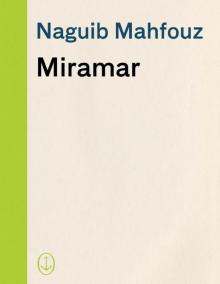 Miramar
Miramar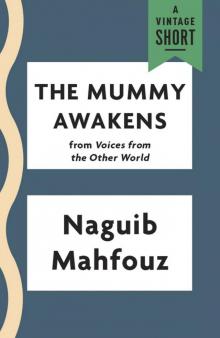 The Mummy Awakens
The Mummy Awakens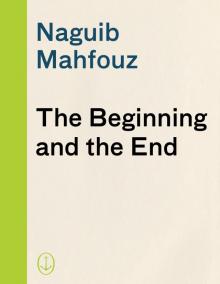 The Beginning and the End
The Beginning and the End Respected Sir, Wedding Song, the Search
Respected Sir, Wedding Song, the Search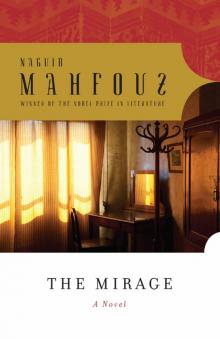 The Mirage
The Mirage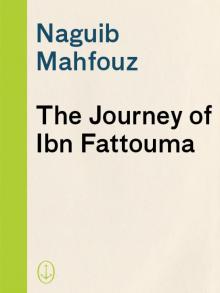 Novels by Naguib Mahfouz
Novels by Naguib Mahfouz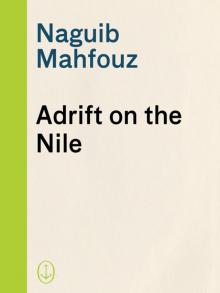 Adrift on the Nile
Adrift on the Nile Karnak Café
Karnak Café Heart of the Night
Heart of the Night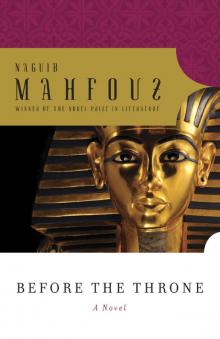 Before the Throne
Before the Throne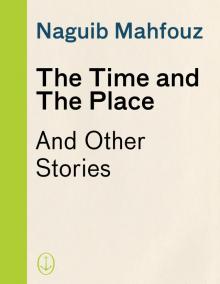 The Time and the Place: And Other Stories
The Time and the Place: And Other Stories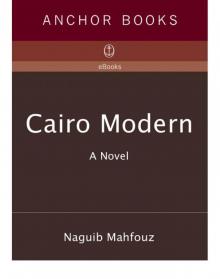 Cairo Modern
Cairo Modern Arabian Nights and Days
Arabian Nights and Days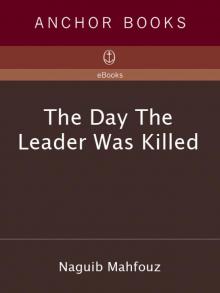 The Day the Leader Was Killed
The Day the Leader Was Killed Morning and Evening Talk
Morning and Evening Talk Three Novels of Ancient Egypt Khufu's Wisdom
Three Novels of Ancient Egypt Khufu's Wisdom Akhenaten: Dweller in Truth
Akhenaten: Dweller in Truth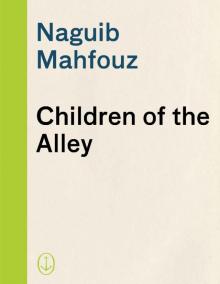 Children of the Alley
Children of the Alley Voices From the Other World
Voices From the Other World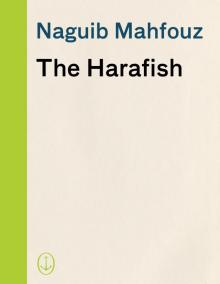 The Harafish
The Harafish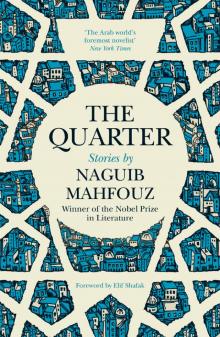 The Quarter
The Quarter The Seventh Heaven: Supernatural Tales
The Seventh Heaven: Supernatural Tales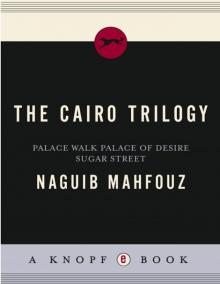 The Cairo Trilogy: Palace Walk, Palace of Desire, Sugar Street
The Cairo Trilogy: Palace Walk, Palace of Desire, Sugar Street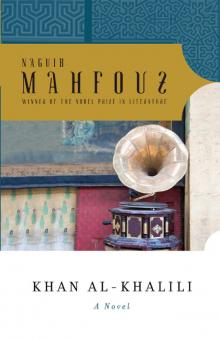 Khan Al-Khalili
Khan Al-Khalili Three Novels of Ancient Egypt Khufu's Wisdom, Rhadopis of Nubia, Thebes at War
Three Novels of Ancient Egypt Khufu's Wisdom, Rhadopis of Nubia, Thebes at War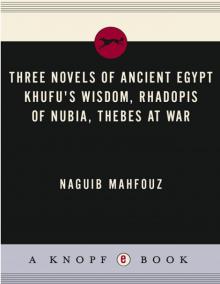 Three Novels of Ancient Egypt
Three Novels of Ancient Egypt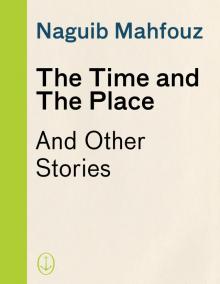 The Time and the Place
The Time and the Place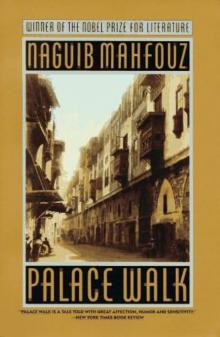 Palace Walk tct-1
Palace Walk tct-1 Akhenaten
Akhenaten The Seventh Heaven
The Seventh Heaven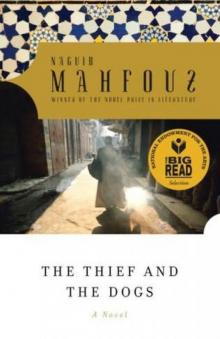 The Thief and the Dogs
The Thief and the Dogs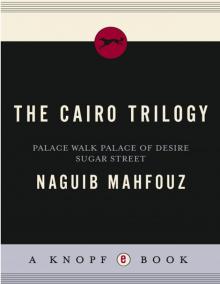 The Cairo Trilogy
The Cairo Trilogy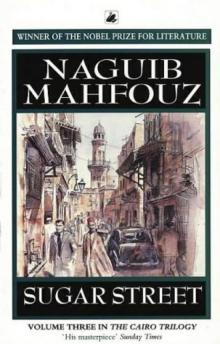 Sugar Street tct-3
Sugar Street tct-3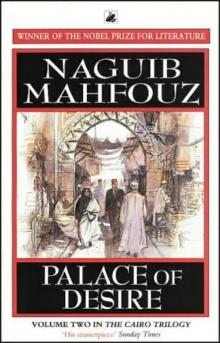 Palace of Desire tct-2
Palace of Desire tct-2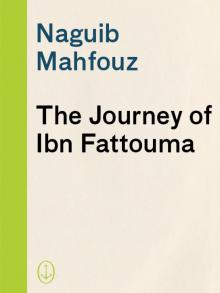 The Journey of Ibn Fattouma
The Journey of Ibn Fattouma